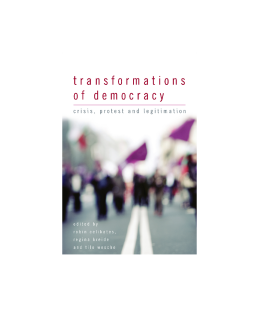
Additional Information
Book Details
Abstract
Is democracy in crisis? On the one hand, it seems to be decaying under the leadership of political elites who make decisions behind closed doors. On the other hand, citizens are taking to the streets to firmly assert their political participation across the globe.
Drawing on a range of theoretical and empirical perspectives, this collection examines the multiple transformations which both the practice and the idea of democracy are undergoing today. It starts by questioning whether there is a crisis of democracy, or if part of this crisis lies in the inadequacy of social and political theory to describe current challenges. Exploring a range of violent and non-violent forms of resistance, the book goes on to ask how these are related to the arts, what form of civility they require and whether they undermine the functioning of institutions. In the final section of the book, the contributors examine the normative foundations of democratic practices and institutions, especially with regard to the tension between human rights and democracy and the special character of democratic authority.
What is the future of democracy in an age of political and economic crisis, transnational governance and global protests? The chapters in this superb volume provide original and profound perspectives on the many dimensions of this question, with contributions that range from normative to legal and sociological analysis. This is political theory at its best - innovative, timely and practice-oriented.
Rainer Forst, Goethe-University Frankfurt
Robin Celikates is associate professor of political and social philosophy at the University of Amsterdam, The Netherlands, where he also directs the research project Transformations of Civil Disobedience.
Regina Kreide is professor of political theory and history of ideas at the Justus Liebig University in Giessen, Germany and is co-director of the Collaborative Research Center Dynamics of Security.
Tilo Wesche is interim professor of practical philosophy at the Justus Liebig University in Giessen, Germany.
This powerful collection resets the discussion of democracy today. The contributors push a rethinking of citizenship, rights, deliberation, and legitimacy as they confront normative democratic theory with the challenges facing real existing democracies: digital technologies that simultaneously increase participation and surveillance; the build-up of unaccountable international institutions; economic crises, inequality, and debt; and, most important, ongoing riots, protests, and mass resistance that call into question democratic institutions themselves. This path-breaking volume not only crosses the divide between normative democratic theory and social theory, it also establishes the terms of debate for decades to come.
Jodi Dean, Hobart and William Smith Colleges
